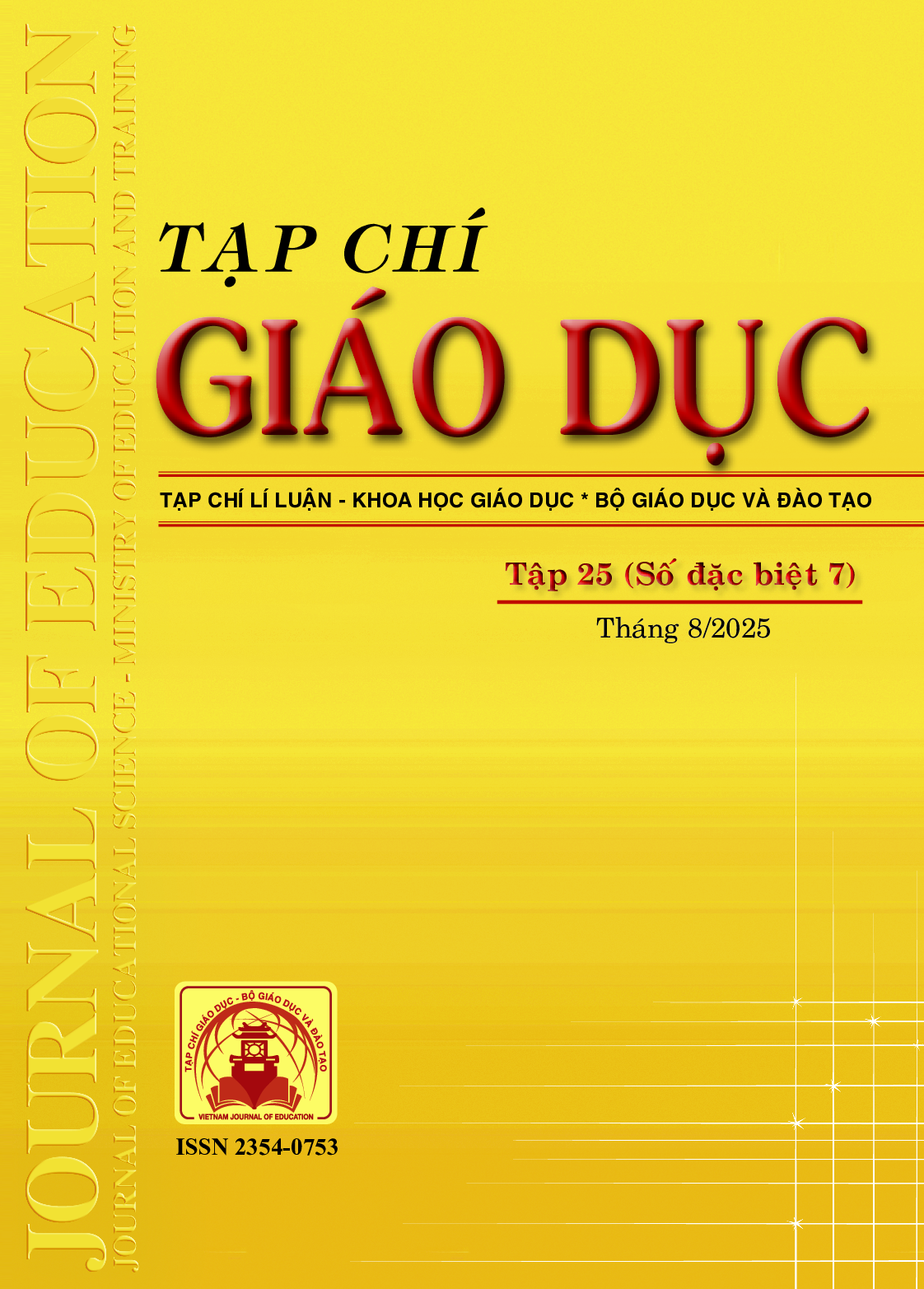Vận dụng mô hình học tập tự điều chỉnh của Zimmerman trong dạy học tích hợp giáo dục đạo đức lối sống cho học sinh tiểu học
Tóm tắt
John Dewey (1938) affirmed: “Education is not preparation for life; education is life itself”. This emphasizes that moral and lifestyle education needs to be associated with practical experience. In the 2018 General Education Program, integrated teaching is identified as an effective method to develop students' qualities and abilities and link subjects. Within the framework of the article, we study Zimmerman's self-regulated learning model and apply it in integrated teaching to educate moral and lifestyle for primary school students. The research results show that this model both enhances self-regulation in learning and contributes to the formation of moral values and practical life skills, creating a foundation for the comprehensive development of primary school students.
Tài liệu tham khảo
Azevedo, R. (2009). Theoretical, conceptual, methodological, and instructional issues in research on metacognition and self-regulated learning: A discussion. Metacognition and Learning, 4(1), 87-95. [https://doi.org/10.1007/s11409-009-9035-7](https://doi.org/10.1007/s11409-009-9035-7)
Bộ GD-ĐT (2018). Chương trình giáo dục phổ thông 2018. NXB Giáo dục Việt Nam.
Boekaerts, M. (2011). Emotions, emotion regulation, and self-regulation of learning. In B. J. Zimmerman & D. H. Schunk (Eds.), Handbook of self-regulation of learning and performance (pp. 408-425). Routledge.
Boekaerts, M., & Cascallar, E. (2006). How far have we moved toward the integration of theory and practice in self-regulation? Educational Psychology Review, 18(3), 199-210. [https://doi.org/10.1007/s10648-006-9013-4](https://doi.org/10.1007/s10648-006-9013-4)
Dewey, J. (1938). Experience and education. Macmillan.
Dignath, C., Buettner, G., & Langfeldt, H.-P. (2008). How can primary school students learn self-regulated learning strategies most effectively?: A meta-analysis on self-regulation training programmes. Educational Research Review, 3(2), 101-129. [https://doi.org/10.1016/j.edurev.2008.02.003](https://doi.org/10.1016/j.edurev.2008.02.003)
Drake, S. M., & Burns, R. C. (2004). Meeting standards through integrated curriculum. ASCD.
Fogarty, R. (1991). The mindful school: How to integrate the curricula. Palatine, IL: Skylight Publishing.
Gardner, H. (2006). Multiple intelligences: New horizons in theory and practice. Basic Books.
Hồ Chí Minh. (1958, 14 tháng 9). Phát biểu tại lớp tập huấn giáo viên cấp II, III toàn miền Bắc. Báo Nhân Dân.
Jacobs, H. H. (1989). Interdisciplinary curriculum: Design and implementation. ASCD.
Kolb, D. A. (1984). Experiential learning: Experience as the source of learning and development. Prentice-Hall.
Lickona, T. (1991). Educating for character: How our schools can teach respect and responsibility. Bantam Books.
Locke, J. (1693). Some Thoughts Concerning Education. A. and J. Churchill.
Makarenko, A. S. (2002). The Pedagogical Poem [Pedagogicheskaya poema] (S. S. Nevvskaya, Ed.; A. S. Makarenko, original work published 1936). Moscow: AST.
Nguyễn Văn Hòa (2019). Dạy học tích hợp trong Chương trình giáo dục phổ thông 2018. Tạp chí Giáo dục, 456, 10-14.
Phạm Viết Vượng (2008). Giáo dục học. NXB Hà Nội.
Pintrich, P. R. (2000). The role of goal orientation in self-regulated learning. In M. Boekaerts, P. R. Pintrich, & M. Zeidner (Eds.), Handbook of self-regulation (pp. 451-502). Academic Press.
Pintrich, P. R. (2003). A motivational science perspective on the role of student motivation in learning and teaching contexts. Journal of Educational Psychology, 95(4), 667-686. [https://doi.org/10.1037/0022-0663.95.4.667](https://doi.org/10.1037/0022-0663.95.4.667)
Schunk, D. H., & Zimmerman, B. J. (1997). Self-regulated learning: From teaching to self-reflective practice. New York: Guilford Press.
Schunk, D. H., & Zimmerman, B. J. (2008). Motivation and self-regulated learning: Theory, research, and applications. Lawrence Erlbaum Associates.
Trần Thị Minh Hằng (2021). Thực trạng giáo dục đạo đức cho học sinh tiểu học tại Việt Nam. Tạp chí Khoa học Giáo dục Việt Nam, 39, 25-30.
Trần Thị Thanh (2016). Dạy học tích hợp phát triển năng lực học sinh (Quyển 2). NXB Đại học Sư phạm.
Vũ Trường An (2022). Phân tích một số mô hình “học tập tự điều chỉnh”. Tạp chí Giáo dục, 22(13), 7-13.
Zimmerman, B. J. (1986). Becoming a self-regulated learner: Which are the key subprocesses?. Contemporary Educational Psychology, 11(4), 307-313. [https://doi.org/10.1016/0361-476X(86)90027-5](https://doi.org/10.1016/0361-476X%2886%2990027-5)
Zimmerman, B. J. (2000). Attaining self-regulation: A social cognitive perspective. In M. Boekaerts, P. R. Pintrich, & M. Zeidner (Eds.), Handbook of self-regulation (pp. 13-40). Academic Press. [https://doi.org/10.1016/B978-012109890-2/50031-7](https://doi.org/10.1016/B978-012109890-2/50031-7)
Zimmerman, B. J. (2002). Becoming a self-regulated learner: An overview. Theory Into Practice, 41(2), 64-70. [https://doi.org/10.1207/s15430421tip4102_2](https://doi.org/10.1207/s15430421tip4102_2)
Zimmerman, B. J., & Kitsantas, A. (2005). The hidden dimension of personal competence: Self-regulated learning and practice. In A. J. Elliot & C. S. Dweck (Eds.), Handbook of competence and motivation (pp. 509-526). Guilford Press.
Zimmerman, B. J., & Moylan, A. R. (2009). Self-regulation: Where metacognition and motivation intersect. In D. J. Hacker, J. Dunlosky, & A. C. Graesser (Eds.), Handbook of metacognition in education (pp. 299-315). Routledge.
Đã Xuất bản
Cách trích dẫn
Số
Chuyên mục
Giấy phép

Tác phẩm này được cấp phép theo Ghi nhận tác giả của Creative Commons Giấy phép quốc tế 4.0 .












